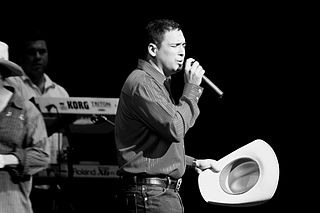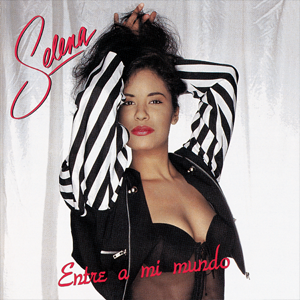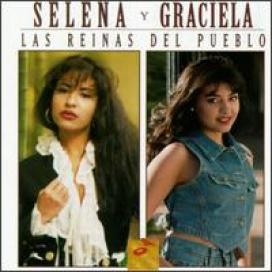
Selena Quintanilla Pérez, known professionally as Selena, was an American singer. Referred to as the "Queen of Tejano Music", her contributions to music and fashion made her one of the most celebrated Mexican-American entertainers of the late 20th century. In 2020, Billboard magazine put her in third place on their list of "Greatest Latino Artists of All Time", based on both Latin albums and Latin songs chart. Media outlets called her the "Tejano Madonna" for her clothing choices. She also ranks among the most influential Latin artists of all time and is credited for catapulting the Tejano genre into the mainstream market.

José Roberto Pulido Jr., known professionally as Bobby Pulido, is an American singer, songwriter, guitarist, and actor. He is acclaimed for pioneering the dissemination of Tejano music to a youthful audience, subsequently ascending as a teen idol and becoming one of the most influential Tejano recording artists among Mexican-American teenagers.

Amor Prohibido is the fourth studio album by American singer Selena, released on March 22, 1994, by EMI Latin. Having reached a core fan base, the label aimed to broaden her appeal with the next studio release. Finding it challenging to write a follow-up hit after "Como la Flor" (1992), Selena's brother A. B. Quintanilla enlisted the assistance from band members Ricky Vela and Pete Astudillo with writing the album's songs. The resulting album has a more mature sound featuring experimental production that blends diverse musical styles from ranchera to hip-hop music. Amor Prohibido is a Tejano cumbia album modernized with a synthesizer-rich delivery using a minimalist style that was quintessential in early 1990s Tejano music.

Ven Conmigo is the second studio album by American singer Selena, released on November 12, 1990, by EMI Latin. The singer's brother, A.B. Quintanilla III remained her principal record producer and songwriter after her debut album's moderate success. Selena's Los Dinos band composed and arranged seven of the album's ten tracks; local songwriter Johnny Herrera also provided songs for Selena to record. Ven Conmigo contains half cumbias and half rancheras, though the album includes other genres. Its musical compositions are varied and demonstrate an evolving maturity in Selena's basic Tejano sound. The album's structure and track organization were unconventional compared with other Tejano music albums. The songs on Ven Conmigo are mostly love songs or songs following a woman's struggles after many failed relationships.

Entre a Mi Mundo is the third studio album by American singer Selena, released on May 6, 1992, by EMI Latin. The label endeavored to bolster Selena's popularity within the Latin music market in the United States with this release. Selena's brother, A. B. Quintanilla kept his role as the singer's producer and, in collaboration with Selena y Los Dinos members Pete Astudillo and Ricky Vela, composed tracks for the album. The ensuing recording encompassed an eclectic array of songs, attributable to the members' diverse backgrounds, which facilitated the modernization of the many genres they explored. Entre a Mi Mundo is a Tejano cumbia album that encapsulated Selena's quintessential sound, characterized by engaging tunes harmonized with her distinctive, plaintive vocals and a relaxed, danceable cumbia beat. The album incorporates musical inspirations from power pop, R&B, disco, rock, funk, and synthesized Tejano music.

Selena is the self-titled debut studio album by American Tejano singer Selena, released on October 17, 1989, by EMI Latin. Its music incorporates a range of contemporary genres with a mix of cumbia and regional styles of Mexican music. The album was released following company president Jose Behar's failed crossover request for the singer. The project was denied by the heads of EMI Records' pop division, believing the singer should first strengthen her fanbase. Selena's brother and principal record producer and songwriter, A.B. Quintanilla III fought to remain the singer's producer. The band introduced Pete Astudillo and Joe Ojeda, who contributed to the album's experimental production and songwriting. Aside from A.B., Selena worked with two Mexican songwriters, Alejandro Montealegre and Reinaldo Ornelas.

Pedro Astudillo, known as Pete Astudillo, is an American singer-songwriter, record producer, and dancer. Referred to as "the Latino Babyface" by The Daily Journal, he is regarded as the architect behind Selena's sound, as he collaborated or coauthored the singer's top-selling and most popular recordings that cemented him into music history. Astudillo wrote or collaborated on some of the most popular Tejano music songs of the 1990s and was inducted into the Tejano Roots Hall of Fame in 2019. His impact on the United States Latin music scene lies in his role as a songwriter collaborator, according to Billboard magazine.

Te Llevo en Mi is the debut studio album by American Tejano music singer Jay Perez. The album peaked at number ten on the US Billboard Regional Mexican Albums chart. It garnered Perez the Billboard Latin Music Awards for New Regional Mexican Artist in 1994, as well as a nomination for the Tejano Music Award for Male Entertainer of the Year at the 1994 Tejano Music Awards. His English-language effort "On This Side of the Door" was nominated for the Tejano Country Single of the Year.
Gary Lee Hobbs is an American singer-songwriter, record producer, and actor. Called "Tejano music's Vince Gill", he has been widely recognized for his resonant baritone vocals, characterized by their emotive quality, and is considered a pioneer within the genre. Hobbs played a significant role in the expansion of Tejano music during the 1990s and became one of the most popular Tejano singers of the 1980s and 1990s.

Las Reinas del Pueblo is a compilation album by American Tejano music singer Selena and Mexican banda singer Graciela Beltrán. Posthumously released on April 4, 1995, by EMI Latin in the wake of Selena's death on March 31, 1995, the decision to produce a compilation album featuring Beltrán emerged after her tribute to the singer at a Houston memorial. The title was inspired by Mexican newspapers that referred to Selena as "an artist of the people" during a 1992 press tour in the nation and subsequently dubbed her "La Reina del Pueblo" in the aftermath of her death. Las Reinas del Pueblo encompasses six tracks by Selena and six by Beltrán, encapsulating their respective tenures with EMI Latin. Las Reinas del Pueblo peaked at number four on the US Billboard Top Latin Albums and Regional Mexican Albums chart, both behind other Selena releases. The recording peaked at number 147 on the American Billboard 200 chart. The album peaked at number ten on the Spanish albums chart in 2010. Beltrán's participation in the album yielded substantial promotional and sales enhancements.

"Como la Flor" is a song recorded by American singer Selena. Written by A. B. Quintanilla and Pete Astudillo, it was released as the second single from her third studio album Entre a Mi Mundo (1992). The song was written by Quintanilla, who was inspired by a family selling illuminated plastic flowers at a concert in Sacramento, California, in 1982. A decade later, Quintanilla was seized with an infectious melody and abruptly dashed out of the shower in a hotel room in Bryan, Texas, to recreate it on a keyboard with Astudillo. He completed the music in just 20 minutes, while Astudillo took another hour to complete the lyrics. "Como la Flor" is an up-tempo, Tejano cumbia torch song that blends tropical cumbia rhythms with hints of reggae and pop music. Its lyrics describe the feelings of a female protagonist addressing her former lover, who abandoned her for another partner. The narrator is uncertain of her ability to love again, while at the same time, wishing her former partner and his new lover the best.

"La Carcacha" is a song recorded by American singer Selena for her third studio album, Entre a Mi Mundo (1992). The song was written by A.B. Quintanilla and Pete Astudillo. It was inspired by a dilapidated car and an experience in which A.B. observed a woman's willingness to court the owner of a luxury car. The song, characterized by its rhythmic melodies and satirical portrayal of life in the barrio, highlights the importance of love and genuine connection over material wealth. It is a Tejano cumbia song that is emblematic of Selena's typical style, while music critics found it to be musically similar to "Baila Esta Cumbia".
Michelle Yvette Lares, best known as Shelly Lares, is an American singer-songwriter, guitarist and percussionist. Starting in 1984, Lares was nominated for Female Vocalist of the Year for thirteen consecutive years and won several other awards at the Tejano Music Awards throughout her career. She signed a recording contract with Manny Records in 1986. She left the label in 1996, and signed with Sony Music Latin until she was dropped in the late 1990s. In 2006, she signed a recording contract with Tejas Records.

Latin music is a term used by the music industry as a catch-all category for various styles of music from Ibero-America, which encompasses Latin America, Spain, Portugal, and the Latino population in Canada and the United States, as well as music that is sung in either Spanish and/or Portuguese. It may also include music from other territories where Spanish- and Portuguese-language music is made.

Steel Rain is the second studio album by American Tejano music singer Jay Perez. The album peaked at number five on the US Billboard Regional Mexican Albums chart. It garnered Perez a nomination for the Tejano Music Award for Male Entertainer of the Year and Male Vocalist of the Year at the 1995 Tejano Music Awards. The title track was nominated for the Tejano Country Single of the Year. One of the songs on the album, "Corazon", is a cover version of Carole King's song with the same title taken from her album Fantasay (1973).

The Voice is the third studio album by American Tejano music singer Jay Perez. The album peaked at number seven on the US Billboard Regional Mexican Albums chart. It garnered Perez a nomination for Album of the Year (Orchestra) at the 1996 Tejano Music Awards. Perez recorded "Let's Get it On", originally recorded by Marvin Gaye.

Toda Mi Vida is the fifth studio album by American Tejano music singer Jay Perez. The album peaked at number eight on the US Billboard Regional Mexican Albums chart. The album received a nomination for Album of the Year (Group) at the 1999 Tejano Music Awards.

Mi Estrella is the eighth studio album by American Tejano music singer Jay Perez. The album peaked at number 13 on the US Billboard Regional Mexican Albums chart. The song "Senorita Tequila" received a nomination for Crossover Song of the Year at the 2001 Tejano Music Awards, while the album garnered Perez his first win for the Tejano Music Award for Male Vocalist of the Year after being nominated for five years.

Un Amigo Tendras is the seventeenth studio album by American Tejano music singer Jay Perez. It is the first album by Perez since New Horizons (2012). Un Amigo Tendras peaked at number 15 on the US Billboard Top Latin Albums chart. The album was nominated for Tejano Album of the Year at the 2016 Latin Grammy Awards. Un Amigo Tendras won Tejano Album of the Year at the 2017 Tejano Music Awards, while the title track won Song of the Year.
La Diferenzia was an American Tejano music septet group based in San Antonio, Texas. Led by Mexican singer-songwriter Ricardo Castillon, its members included Mexican songwriter Miguel Spindola, saxophonist and keyboardist Raul Arnold, bajo sexto player Omar Cardenas, accordionist Simon Arausa, guitarist Jesse Moya, and Jose Luis Benavides on the drums. The group chose "Diferenzia" to stand out from other Tejano bands and wanted to offer a variety of musical styles. Castillon wanted to provide listeners with Tejano, mariachi, merengue, cumbia, and ballads. Ricardo and his brother, Ramiro Castillon, started La Diferenzia, recording under Manny Guerra's label in the late 1980s. Following Ramiro's death during a car accident in 1991, the group disbanded.

















